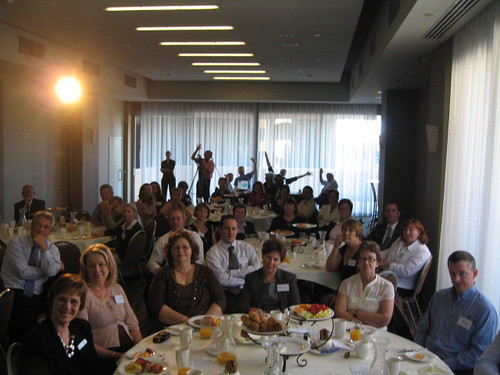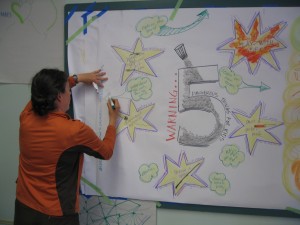 I’m very excited to co-host a visual practice learning event this year with my energetic and creative co-conspirator, Michelle Laurie. (Graphic Facilitation Jam 2011) We had a great time with the first version in August of 2010 in BEAUTIFUL Rossland, BC. Any excuse to plan another vacation there sounded good to me. The first round taught me a lot. If you aren’t from the area, you can fly into Spokane, Washington and drive up.
I’m very excited to co-host a visual practice learning event this year with my energetic and creative co-conspirator, Michelle Laurie. (Graphic Facilitation Jam 2011) We had a great time with the first version in August of 2010 in BEAUTIFUL Rossland, BC. Any excuse to plan another vacation there sounded good to me. The first round taught me a lot. If you aren’t from the area, you can fly into Spokane, Washington and drive up.
Graphic Facilitation Jam 2011: Using Visuals for Effective Engagement
2011 Date and Time: July 13 (5-9pm), July 14 (9-4pm) and July 15th (9-4pm)
Location: Prestige Mountain Resort, in beautiful, Rossland, BC, Canada
This experiential jam takes place almost entirely at the drawing surface. We’ll start the evening of July 13th by warming up our drawing muscles and silencing those pesky inner censors. The second day, we’ll build into the basic practices of graphic facilitation and recording. We will pay attention to preparation, the actual visual work, and follow up including digital capture of paper based images. Our third day will be devoted to participatory graphic approaches, practicing and giving peer feedback. Build your repertoire of icons, ideas and approaches which you can use immediately, as well as ideas about how to hone your practice.
When might we use this practice?
Sometimes our imaginations are sparked by a visual where words fail us. Think about when communities plan and imagine their futures, when teams consider the possible outcomes for their projects, when groups create maps to track their progress. These are all opportunities to use visuals to engage and deepen community dialogue. You can use visual thinking to improve teamwork, communications, meetings, build engagement and to plan work. Step out of the PowerPoint rut!
Who should attend?
Playful people! Newbies and experienced! Facilitators, project managers, team leaders and members, town planners, teachers and anyone who would like to engage others beyond words. Please note: You do NOT need previous experience or have to consider yourself an artist. At some level, we can all draw and use visuals to enhance our communications and engage diverse audiences.
Detailed Agenda:
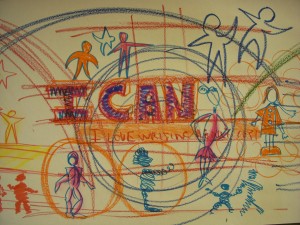 Part 1: I CAN DRAW – Hands-On Writing on Walls (July 13 evening, 6-9 pm including light snacks and beverages)
Part 1: I CAN DRAW – Hands-On Writing on Walls (July 13 evening, 6-9 pm including light snacks and beverages)
Description:
Tonight we’ll touch the paper, play with the pens and loosen up our drawing muscles. We’ll address the basics of “drawing on walls” including starting shapes, lettering and some initial iconography. We’ll cover basic techniques and tricks that enable any of us to draw as a way of capturing and communicating ideas with each other. We’ll ask ourselves some questions, such as “What if you draw your notes instead of wrote them?” “Visually captured what is happening at a meeting or in a classroom?” “Engage people beyond words and text?” How would that change the experience for you and others?
When we get tired, we’ll spend some time looking at the work of diverse graphic facilitators, see how books can inspire us and play a bit with materials. Dress for mess!
For a sense of a very short I CAN DRAW session, here is 6 minutes from a lightening fast 45 minute workshop at Northern Voice in 2009.
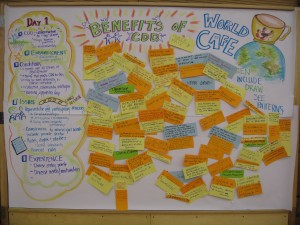
Part 2: Using Visuals With Group Processes & Facilitation Methods (July 14th morning)
Description: In the morning we’ll explore how visuals can enhance group processes such as planning, meeting and evaluation. We’ll do mind maps, mandalas and simple flip chart enhancements that you can immediately use. We’ll look at the use of visuals with some specific group facilitation methods such as World Cafe, Open Space, Appreciative Inquiry, and others. This part of the workshop includes lecture, conversation and lots of hands on experience. We’ll explore practical applications while we continue to learn to write on walls, the base elements of the practice of graphic recording and facilitation.
Part 3: More on Graphic Recording (July 14 afternoon)
This afternoon we’ll focus on traditional graphic recording (actively listening and capturing what is going on in a group, rather than using graphics as a facilitation device). We’ll review and practice how to listen for key ideas, iconography, and organizing space. We’ll do a number of practice drawings then review our own work. We will hold several practice sessions in the safe space of the classroom. This time will prepare you to record confidently in real work settings.
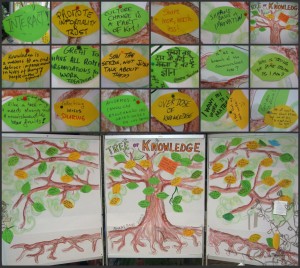 Part 4: Participatory Graphics and More Practice (July 15)
Part 4: Participatory Graphics and More Practice (July 15)
Building on our drawing and exploration of visual practices in whole group processes, we’ll experiment more with participatory graphics. This is when the pen goes into everyone’s hands, not just the graphic recorder’s. When people “make their mark” it changes their experience and ownership of the experience. It can open up how they talk and think about things.
We’ll look at a range of participatory visual practices including methods such as visual icebreakers, “River of Life”, ” Knowledge Tree,” and other examples. Think about your group’s situations and needs and we can work to imagine practices that might help your real work!
We’ll intersperse our learning sessions with practice and feedback periods. We’ll finish by looking at some of the resources available to visual practitioners!
Daily Graphic Jams!
From 4-5pm each day we’ll offer an optional opportunity to practice visual thinking and drawing of key words and icons.
Preparation:
- Come prepared to get your hands dirty.
- Dress is comfortable clothes that can get dirty and you won’t be sad if they are stained.
- Bring a pad of paper or journal to take notes – unlined is terrific.
- Bring a digital camera to record the fruits of your labor.
- We’ll bring paper, tape, some pens and chalk. Bring along your favorite supplies.
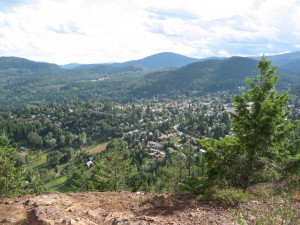 Location
Location
The beautiful alpine city of Rossland, BC. Accommodation options have been suggested below.
Jam Hosts:
Nancy White is the workshop facilitator. “I am a learner, mom, gramma and chocoholic. I founded Full Circle Associates to help organizations connect through online and offline strategies. My practices are diverse, including online interaction designer, facilitator and coach for distributed communities of practice, online learning, distributed teams and online communities, doodler and visual practitioner. I have a special interest in the NGO/NPO sector and the emerging practice of using communities and networks for work and learning. I blog at http://fullcirc.com/wp/, teach, present and write on online facilitation and interaction, social architecture, social media and visual practices. I am co-author with Etienne Wenger and John Smith of Digital Habitats: stewarding technology for communities (http://www.technologyforcommunities.com). Lately not only do I like to draw on walls (graphic facilitation), but I spend a lot of time cooing over my new grandbaby!!! For more about my visual practice see http://fullcirc.com/wp/about/visual-and-graphic-work/.”
Michelle Laurie is hosting the workshop and is your key contact for more information. “As the workshop host, I draw on over ten years of experience helping local and international organizations and partnerships communicate as well as improve the way they create and share knowledge. I have been successfully incorporating visual thinking into my work particularly with the use of participatory graphic exercises and visual aids. My areas of expertise include sustainable development, collaboration and learning.”
Accommodation
There are several nice B&Bs in Rossland.
B&Bs
http://www.visitred.com/ private 2 bedroom suite and 1 single room, call Angela to discuss details, she always gives great service and great rates, 250 362 7790.
http://www.sweetdreamsheritageinn.com/rooms.html ($80/night ($85/double) with breakfast for workshop participants, Nancy says the breakfasts are AMAZING!)
Prestige Mountain Resort – www.prestigehotelsandresorts.com
We’re looking into a deal… stay tuned!
Food/Snacks/Lunch
There are several places in the workshop vicinity to eat a quick lunch.
Nancy promises to bring chocolate…
More info
For more information email Michelle Laurie michelle.k.laurie@gmail.com
